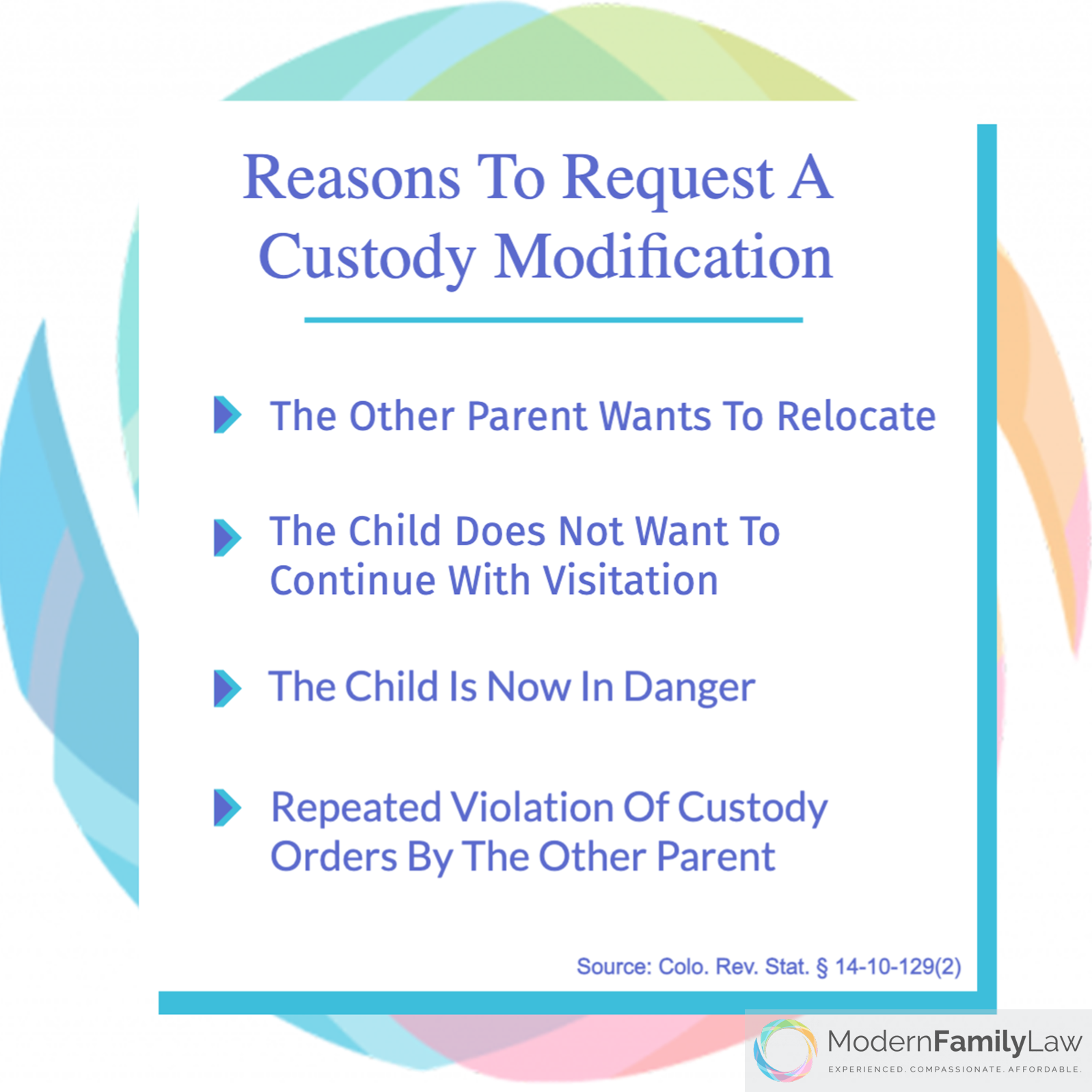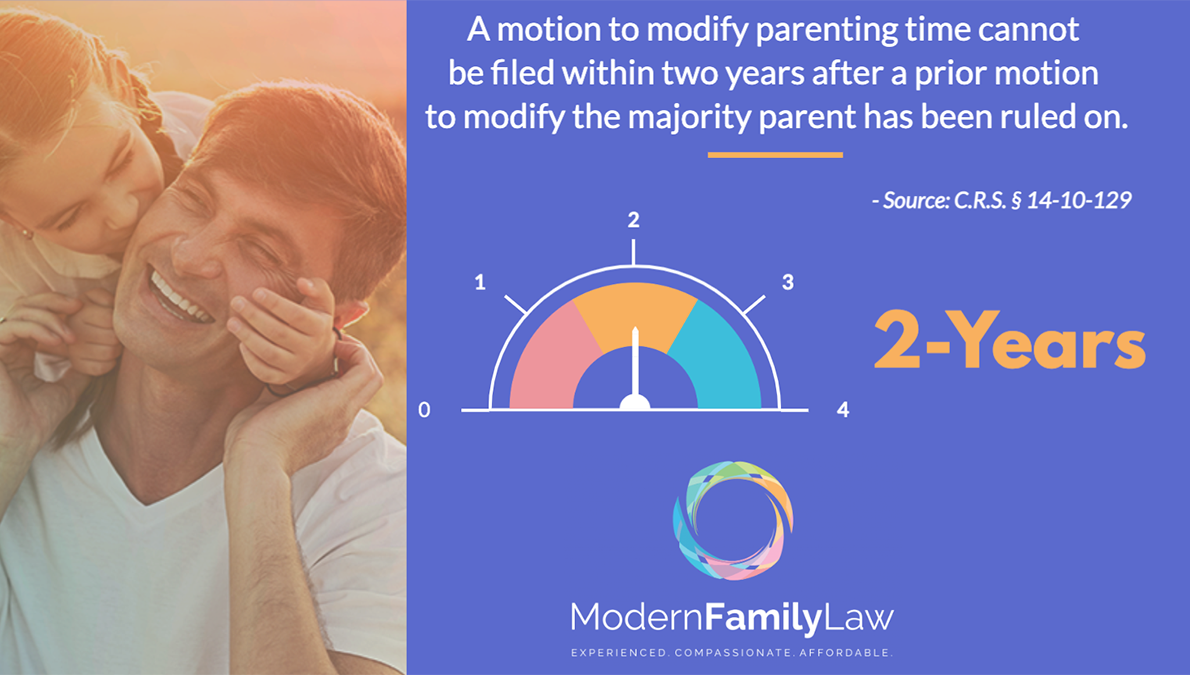CUSTODY MODIFICATION
ATTORNEYS IN COLORADO
Modern Family Law's custody modification attorneys in Colorado specialize in helping parents modify existing child custody and parenting time agreements. Our attorneys have extensive knowledge of Colorado's laws and regulations surrounding child custody and the legal process of modifying these agreements. They can provide guidance and representation to parents who are seeking to change the terms of their current custody arrangement.
MFL's custody modification attorneys can assist with a variety of issues, such as requesting a change in the primary residence of the child, seeking more parenting time with the child, or modifying the terms of a current parenting plan. They can also help parents navigate the legal process, including filing the necessary paperwork, negotiating with the other parent or their attorney, and representing their clients in court. Learn about custody modification in Colorado below, including:

Our experienced Colorado child custody attorneys understand that no case is the same. We encourage you to reach out and share the details of your case with them so they can provide you with the guidance you need. Whether you are considering modifying your child custody or parenting time agreement, it's important to consult with a qualified custody modification attorney. They can provide you with the legal expertise and guidance you need to make the best decisions for your child and to ensure that your rights and interests are protected throughout the process.
WHAT IS
CUSTODY MODIFICATION?
In Colorado, a custody modification is a legal process through which a parent can ask the court to change the existing custody arrangement for their child. This could include changes to parenting time, decion-making, or both. A parent may seek a modification if there has been a significant change in circumstances, such as a move, a change in the child's needs, or a change in the parent's ability to care for the child. The court will consider the best interests of the child when deciding whether to grant a modification.
Custody modification can also describe a situation when a parent is seeking to change who the custodial parent is. According to Colorado Revised Statutes 14-10-129(2), a court will not modify a previous custody order that significantly alters parenting time and changes the primary residential parent, unless one of the following conditions is met:
- The parents have reached an agreement on the matter
- The child has been fully integrated into the moving party’s family with the consent of the other parent
- The primary residential parent is planning to relocate with the child
- The child’s current environment poses a danger to their physical health or harms their emotional development, and the potential harm of a change of environment is outweighed by the benefits of the change.

In most cases, a parent who is seeking a modification of custody must demonstrate that the proposed change would be in the best interests of the children. However, when a modification would involve a shift in majority parenting time or a change in the primary residential parent, the standard of proof may be higher.
HOW IS PARENTING TIME
MODIFIED IN COLORADO
In Colorado, parenting time can be modified by filing a motion with the court and requesting a hearing. The parent seeking the modification must provide evidence that there has been a significant change in circumstances that would warrant a change in parenting time. The court will consider the best interests of the child in making its decision. If the court determines that a change in parenting time is appropriate, it will issue a new order outlining the new parenting schedule.
Pursuant to C.R.S. 14-10-129(2), a court shall not modify a prior order which substantially changes parenting time and changes the majority residential parent unless:
- The parents agree,
- The child has been integrated into the moving party’s family with the consent of the other party,
- The majority residential parent is seeking to relocate with their children, or
- The child’s present environment endangers the child’s physical health or significantly impairs the child’s emotional development and the harm likely to be caused by a change of environment is outweighed by the advantage of a change to the child.

The court will consider the best interest of the children in any decision that is made and it is advisable to consult a attorney when filing such motions.
HOW IS DECISION-MAKING
MODIFIED IN COLORADO?
In Colorado, If a court has issued legal decision-making orders for your child, any changes to those orders must be approved by the court. Reasons for seeking modifications may include a parent's relocation, changes in the child-parent relationship, or the belief that the current agreement is not in the child's best interest.
The court has established limits on changes to custody arrangements in order to ensure that the child's living situation remains stable and that the child has the opportunity to form a bond with each parent. Additionally, it is important to know that once a motion for modification of legal decision-making has been filed, another motion cannot be filed for at least two years, unless exceptional circumstances exist such as the child is in physical or emotional danger. In order for decision-making to be modified, it must be shown that:
” A change has occurred in the circumstances of the child or the child’s custodian or party to whom decision-making responsibility was allocated and that the modification is necessary to serve the best interests of the child.“
If a parent feels that it is in the best interest of the child to modify decision-making, they must file a motion with the court and request a hearing. The parent seeking the modification must provide evidence that there has been a significant change in circumstances that would warrant a change in legal decision-making.
CAN I RESTRICT THE OTHER PARENT'S
PARENTING TIME?
Under C.R.S. § 14-10-129(4), an emergency motion to restrict parenting time can be filed when a child is at imminent risk of danger from the other parent. This type of motion should be used sparingly and only in serious situations. It is important to have an attorney with knowledge of the court's standards for determining imminent danger when filing such a motion, as misuse can damage credibility with the court.
To be successful, the motion must prove that there physical or emotional danger and that that danger is imminent. The court has discretion to determine if the actions of the other parent actually put the child at risk. The hearing will happen within 14 days of filing and both parents can present evidence and argue their positions. The court will then decide if the motion will be granted, modified, or denied.

WHAT OUR CLIENTS SAY ABOUT OUR
EXPERIENCED CUSTODY MODIFICATION LAWYERS IN COLORADO
I only ended up choosing another attorney to go with because of some very specific nuances of my case. However, before I went with that attorney, Grace was at the Top of my List! I highly recommend her and Modern Family Law Firm. They consulted the extreme vulnerability of my situation so delicately and with the utmost professionalism, and I thank them for their consideration and time 🙂
I only ended up choosing another attorney to go with because of some very specific nuances of my case. However, before I went with that attorney, Grace was at the Top of my List! I highly recommend her and Modern Family Law Firm. They consulted the extreme vulnerability of my situation so delicately and with the utmost professionalism, and I thank them for their consideration and time 🙂
I would recommend her to anyone. 5 stars all around. Thank you!!!!
I would recommend her to anyone. 5 stars all around. Thank you!!!!
FREQUENTLY ASKED QUESTIONS ABOUT
CUSTODY MODIFICATION IN COLORADO
What Happens To My Parenting Time & Decision-Making If I Am In The Military And Get Deployed?
The Colorado legislature recognizes the unique circumstances of military deployment and has established special provisions in C.R.S.§ 14-10-131. According to this statute, any changes to parenting time or decision-making during deployment are considered temporary by the court. It is recommended that service members make agreements regarding parenting time and decision-making before deployment. Upon return and filing a notice with the court, previous parenting time and decision-making orders will resume. This ensures that deployment will not negatively impact future legal proceedings. However, the standard requirements for modifications of legal custody and decision-making still apply. Our firm is prepared to assist military members with their custody and visitation matters, both before and after deployment.
When Is A Stipulation Agreement Used For Modifying Custody?
In Colorado, if you and your co-parent agree on changes to child custody, you can use a stipulation to request the court to modify your responsibilities. The form to use is called the JDF-1415, the Verified Stipulation to Modify Decision-making Responsibility. You may also need to provide a Parenting Plan form that shows the court your proposed new parenting plan. It is important to note that a stipulation is only appropriate if you and the other parent agree on all the changes to the existing order. If there is disagreement on any point, a motion must be filed instead of a stipulation.
When Is A Parent Considered Unfit For Custody In Colorado?
In Colorado, a parent may be deemed unfit if they are unable to meet the needs of their child or if they have endangered the child’s physical or emotional well-being. However, the courts have strict standards for determining unfitness and do not make this decision based on generalizations. Instead, they consider the specific circumstances of the case and evaluate factors such as:
- Severe physical injuries inflicted on the child
- Physical or sexual abuse of the child
- Neglect of the child
- Excessive use of alcohol or drugs
- History of sexual assault or violence
- Involvement in the death or injury of another child (if any)
- Termination of parental rights ordered by another judge in another state (if any)
- The emotional or mental well-being of the parent
- Involvement in previous cases of dependency or neglect (if any)
Even when some of these circumstances are present, it doesn’t automatically constitute an unfit parent. In many instances, the parent will be given the opportunity to complete parenting classes or receive treatment for an alcohol or drug problem prior to them being deemed unfit.
OUR COLORADO CHILD CUSTODY LOCATIONS
COLORADO SPRINGS
CHILD CUSTODY LAWYERS
9362 Grand Cordera Pkwy Suite 205,
Colorado Springs, CO 80924
FORT COLLINS
CHILD CUSTODY LAWYERS
3711 John F Kennedy Pkwy Suite 225,
Fort Collins, CO 80525
(970) 410-8241
OUR COLORADO FAMILY LAWYERS
ARE READY TO LISTEN!
Our experienced child custody attorneys in Colorado work to help clients
make the best decisions for their children's well-being with custody modifications.
Reach out today to and let our experienced attorneys keep you connected with your children.
Schedule A FREE
Consultation
